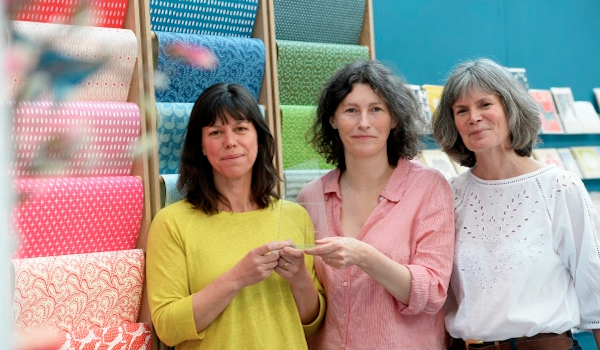
THREE IS THE MAGIC NUMBER
The trio behind Cambridge Imprint creates a colourful range of products in pattern paper and ceramics, using block-printing and hand-stencilled silk screening. Combining the artful eyes of painter Claerwen James, textile artist Jane Powell and ceramicist Ali Murphy, Cambridge Imprint uplifts the beauty in everyday objects, and we're excited to have them at the Selvedge Fair in Charleston on Saturday. We talked to the team amidst all the preparation...

What made you start the company?
All three of us treasure similar everyday objects of no great monetary value: a scrap of patterned paper; a pink lustreware cup; a worn wooden spoon. This shared appreciation and the fun of making something beautiful together, was the driving force behind our collaboration.
What inspires you?
We take inspiration from far and wide – American quilts, Barron and Larcher block-print fabrics, Uzbek Suzani and Japanese paper.
Who influences your work?
The cheerfulness and humour of the printing done by the Curwen Press during its golden age in the twenties and thirties is a touchstone for our patterns, illustration and typography. Recently, finding a feature about their V&A exhibition in Selvedge issue 59 reignited an interest in the glorious colour and inventiveness of the costumes for Diaghilev’s Ballets Russes.

What's your favourite part of the process?
Printing a new design for the very first time. Our designs are drawn onto silk screens by simply blocking out the negative spaces by hand. We mix our own colours in the studio; it’s exciting finding a palette that brings the designs to life.
And what’s the hardest part?
Shlepping the stock up and down a spiral staircase to the studio - paper is surprisingly heavy.
How long does it take to make one product?
Our design process is very traditional – we start with just a pencil and paper, erasing and redrawing. Or we use paper cut-outs, rearranging elements, drawing with blocks of colour. Occasionally we use an ancient black-and-white photocopier to change the scale or make lots of repeats. But that is the full extent of our technological support. We all work on our own pieces, asking for feedback from each other as an individual pattern develops. The printed prototypes cover the studio walls. Some designs are immediately put into production, others take time to grow on us.

Where do you live and why?
We all grew up in Cambridge and two of us chose to move back here in adulthood. Until recently it was a sleepy country town with cows grazing on common land right in the centre of town, amongst the extraordinary architecture and vibrant cultural life of the University. The pared down simplicity of Jim Ede’s beautiful, unpretentious house at Kettle’s Yard, was a strong local influence on all of us. When we were children you had to change trains at Royston on your way from London, because the track wasn’t electrified all the way. Now the fast rail link and the growth of the tech sector have woken the sleepy town up and it is changing fast. We’re trying not to be too sad about it.
Paint us a picture of your ideal Sunday...
A walk in the hills or on a deserted beach. A freshly cooked bacon sandwich and a thermos of tea. A good book or film in front of an open fire and a slow cooked stew for supper, by candlelight.
What's your favourite colour?
We are about to print some papers in a pale translucent grey-turquoise, which look beautiful against our more vibrant colours.

If you could go anywhere in the world tomorrow where would you go?
Uzbekistan, to look at silk ikat.
What do you typically listen to whilst working?
We tend to work in silence or with BBC Radio 4 on in the background.
What are you reading at the moment?
We are steadily working our way through the Persephone Books back catalogue. We love the end papers: each one a textile printed in the year of the book’s original publication. The books themselves are all great reads, rightly rescued from undeserved obscurity. High Wages by Dorothy Whipple, a novel about a shop girl who sets up her own dress shop in a northern town, was completely gripping; as was Round About A Pound A Week; a contemporary investigation of household expenditure among the working poor in Lambeth at the turn of the last century. We also eagerly await the arrival of Slightly Foxed, a beautifully produced quarterly full of recommendations for out-of-print books.
You can see Cambridge Imprints at the Selvedge Fair in Charleston this Saturday October 14th. To find out more about the fair and to avail of our two for one offer on all tickets, click here.
